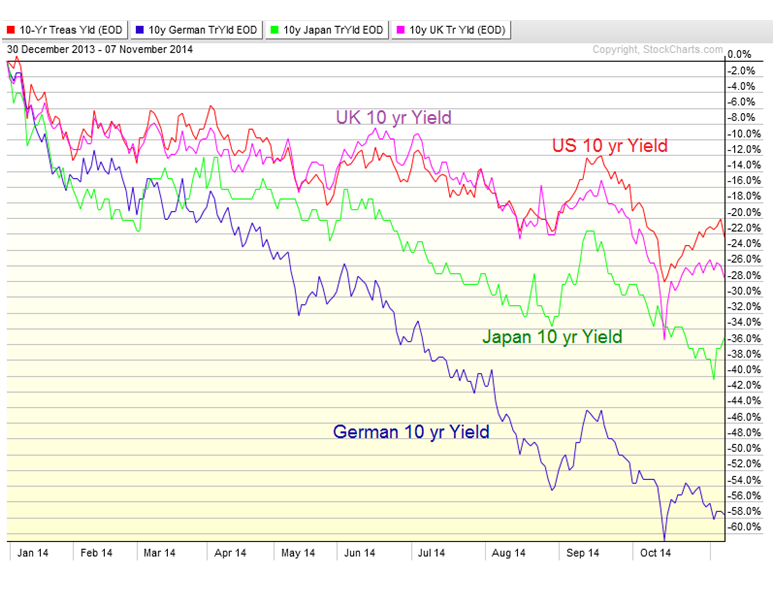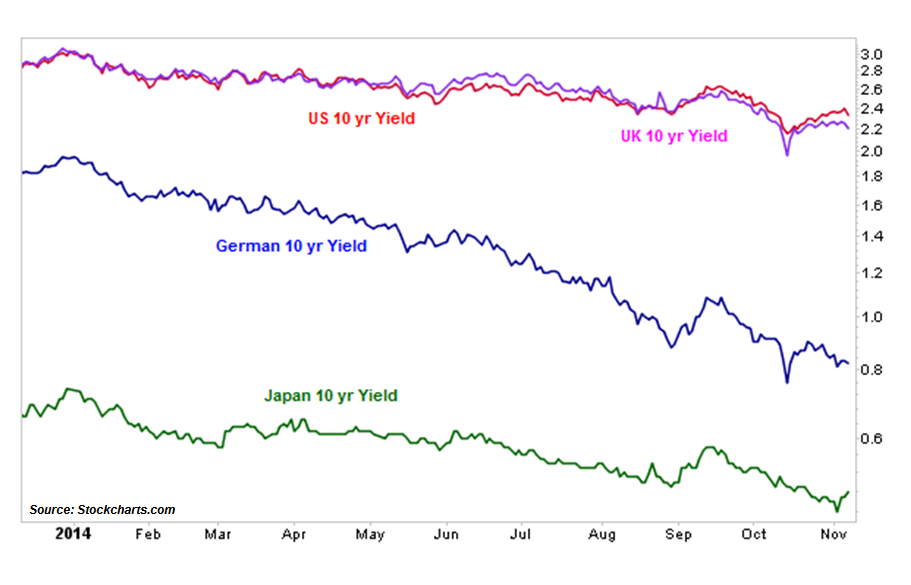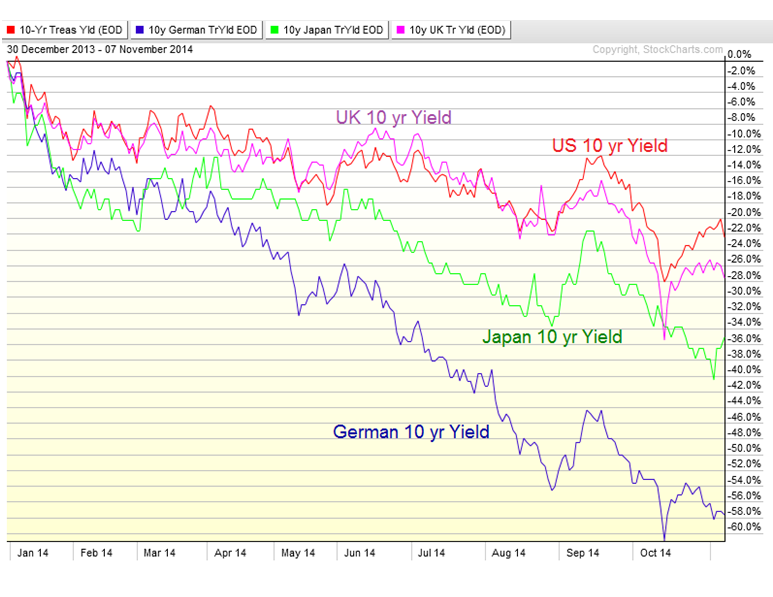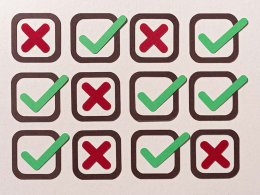by J.C. Parets, All Star Charts
One of the things that has consistently brought a smile to my face throughout 2014 is how wrong Wall Street economists have been on interest rates this entire year. The markets who are, by definition, forward-looking nailed the bond trade coming into the year. Fed Fund Futures were suggesting rates would stay down this year while the backward-looking economists all said rates would rise. In fact, 67 of 67 Wall Street economists polled said rates in the US would rise this year so it was time to sell bonds. In actuality, 2014 turned out to be one of the best years in the history of the US Bond Market and interest rates fell from 3% to 2% last month before bouncing a bit (in 10yr Yields).
Now that we are almost half way through November (can you believe that?), I start to think about what some of my bigger themes are going to be for next year. I know I’m going to get asked by 100 different people over the next 6 weeks, so I might as well have an answer ready. When it comes to stuff like this, I prefer to stick to bigger trends, as opposed to long this or short that tactically. I’m thinking my “big idea”, if there is such a thing, is that economists will be wrong once again and rates stay down.
Here’s how I see it. Interest rates have been falling for 35 years. This isn’t anything new. My biggest question is why everyone is in such a rush to pick a bottom in rates? We know “rates will eventually rise”. You hear pundits say that all the time, and it makes my stomach cringe. OF COURSE rates will eventually rise. Thanks buddy. The question is, “WHEN?”. We all know there is going to be a decade-long/multi-decade bear market in bonds coming eventually. That’s not a secret. But if the one thing that we do know is that once rates start to rise, they will keep rising, then why can’t we just wait? What’s the rush? I don’t get it? If they asked me or anyone else in the late 90s in which direction rates were headed in Japan, we all would have said higher. Guess what? 15 years later where are they? I don’t think the US has to be another Japan, but I’m just making the point that rates don’t have to do anything.
Historically, the bottoming process for US Interest Rates takes 10-15 years. Think about this: the bottoming process in rates during the 1820s-1830s took over 10 years after the Erie Canal was finally completed changing the landscape of America forever. The bottom in rates during the 1890s-1910 took about 15 years and wasn’t until after the panic of 1907 that rates really started to rise. Then the bottom in rates during World War II took another 10-15 years to bottom out. So why should this time be different?
Coming into the year, long bonds was one of my favorite trades by far. And then based on all of the evidence available, I continued to think we’d see higher bond prices as we headed into the second quarter (See here). The forward looking Fed Fund Futures weren’t pricing in rate hikes anytime soon and for some reason economists decided to continue to ignore that. They all believed rates would rise (or were told to believe that, we don’t know).
US Treasury Bonds have obviously been the best performing asset class this year and rates have been crushed. But this sentiment unwind can also be seen in the stock market as the high dividend paying Utilities are the best performing US Sector year-to-date up over 25%. Investors searching for yield haven’t been able to get it in the bond market (as economists had suggested), so they need to get it in the stock market. Real Estate Investment Trusts who are also some of the highest dividend paying stocks are also dominating this year up over 23% year-to-date. We suggested in January that this strength was pointing to lower rates (see here). These sectors by far and away have been the outperformers this year.
So now what? Why do I think rates stay down for now? Well this strength in Utilities continues. Utes are up over 16% in the past 3 months almost tripling the performance of the US Stock Market as a whole. Economists for some reason continue to ignore forward looking markets. Wall Street Economists Consensus is that Fed Funds will end next year near 1%. They are so stubborn. Meanwhile, the forward looking Fund Fund Futures market is pricing in half of that, and the probabilities are nothing to be excited about. There’s actually only a 63% chance of the first hike in September, based on the price of fed fund futures contracts. Is that enough to sell bonds? Not for me. No thank you. Economists who don’t put any money to work can keep telling everyone to sell bonds. The free markets that, by definition, are made up of people who actually put money to work continue to tell us to buy bonds and overweight higher dividend paying stocks.
I’m a weight-of-the-evidence kind of guy. Interest rates around the world are getting killed. Look at this chart of 10yr rates for Germany, Japan and UK, some of the most important debt markets, compared to the United States. The first is the actual change in rates year-to-date while the second is the percentage change:
Money is flowing into the US Bonds looking for the yield they aren’t getting elsewhere. Rates around the world are getting destroyed even worse than in the US. So money continues to come in to the US Bond Market. We still haven’t seen any evidence to suggest that this enormous global trend has changed.
Meanwhile, we like to see what the smart money is doing. The economists who don’t put any money to work are still telling us to sell bonds. The commercial hedgers are telling us to keep buying. Even though the hedgers nailed the trade coming into the year not hedging bonds at all, they continue to stay away from the hedge which tells us the smart money thinks we still head higher in bonds (lower rates). Economists who have been wrong this entire time, are sticking with their wrong bets. We love to see that.
Also, we have our a proprietary sentiment model that takes into account a lot of data points. Coming into the year we were seeing extreme pessimism towards the bond market. Historically when everyone thinks a crash is coming, it usually doesn’t come. This is just another good example of that. With such an incredible move this year in bonds, we would have expected that sentiment to really shift in the opposite direction. But we actually haven’t seen that at all. In fact, our sentiment data suggests more of a neutral stance from the public right now. Everyone is more in a, “we have no idea” kind of mode. That’s a lot more bullish for bonds than if they would have shifted towards extreme optimism like we would have expected based on this incredible price action.
I really think rates stay down. And I believe economists get it wrong again. The best way to express that, in my opinion, is to stay overweight higher dividend paying stocks and continue to buy any weakness in US Treasury Bonds, particularly on a relative basis to other countries’ debt.
Copyright © J.C. Parets, All Star Charts
















